From AI to Zelensky, what Times experts predict for the year ahead
What are the prospects for war in Ukraine ending? Can Charles III’s coronation reset the monarchy? Ten writers attempt to forecast the future.

After a year that brought three prime ministers, two monarchs and Europe’s bloodiest conflict since the Second World War, plenty of questions remain. Will there be a general strike? Can Trump rise again? And after ending 56 years of hurt, could the Lionesses win the World Cup, too? Here, ten writers attempt to forecast the future …
WHAT ARE THE PROSPECTS FOR WAR IN UKRAINE ENDING IN 2023?
Catherine Philp, Diplomatic Correspondent: Little has gone to plan for President Putin since he launched his invasion of Ukraine in February. This year is just as likely to bolster the maxim that everything about war is unpredictable.
Kyiv’s prediction, however, is that while Putin may be down he is certainly not out and, having declared his highly unpopular “partial mobilisation”, is laying plans to throw some 200,000 reservists at a new spring offensive in Ukraine’s east.
While western officials see the conflict as deadlocked during freezing conditions in Ukraine throughout the past month, Kyiv is much less certain that the time has come to talk peace. The sudden Russian barrage against Kherson, the southern city recaptured by Ukraine in November, is potent evidence that Moscow may not be running as short on artillery as some outside analysts claim.
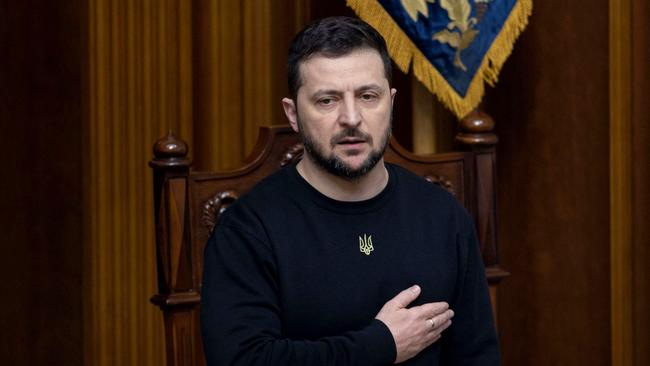
President Zelensky, meanwhile, has returned triumphantly from Washington - his first trip outside Ukraine since the invasion and evidence of his confidence in his position - with the promise of Patriot batteries, the most powerful tool yet against Russia’s missiles. Yet their arrival is far later than it should have been and it will take time to train soldiers to use them.
Putin’s many failures may bolster the case for a frozen conflict in which Ukraine comes under pressure to negotiate. Russia has a land bridge that can resupply annexed Crimea and continue to threaten Ukraine’s hold on the south of the country.
If Ukraine can cut that bridge, putting even Crimea within artillery range, it can negotiate from a position of strength, perhaps the only one that will dissuade Moscow from launching a fresh attack on Ukraine in a few years’ time, exactly as it did when the world turned more or less a blind eye to its 2014 annexation of Crimea.
The most likely prediction for 2023 is that the year ends with the conflict unresolved. Kyiv may crave victory but would certainly prefer such a deferred resolution to a peace treaty that rewards the aggressor.
THE UK WILL FALL INTO RECESSION - HOW BAD WILL IT BE?
Mehreen Khan, Economics Editor: Britain’s economy is probably already in recession and 2023 will be a year in which economic growth and rising living standards will all but vanish.
The latest recession is on course to mirror the downturn experienced in the early 1990s, when the country suffered from an overvalued exchange rate, high interest rates and a housing market crash.
This time the recession will be driven by the familiar spectre of high inflation and rising borrowing costs that will cause a historic drop in households’ disposable income. The government’s budgetary watchdog thinks the decline in living standards over 2022-2023 will be the worst since records began in the early 1950s.
Households are facing a triple whammy of shocks: record energy bills, high inflation, which has raised the cost of all goods and services, and wages that are not keeping up with these price rises. On top of this, about two million homeowners will be re-fixing their mortgages in 2023 and face having to pay steep increases in their monthly borrowing as interest rates will hit 4 per cent by the spring.
It won’t be entirely doom and gloom. The value of the pound, which hit an all-time low in 2022, should stabilise as the dollar’s record strength eases off. Double-digit inflation could also fall dramatically this year if energy prices are contained, falling to about 4-5 per cent by the end of the year. At best, the green shoots of recovery could emerge by the end of the year.
WILL THERE BE MORE POLITICAL TURMOIL, A GENERAL ELECTION - AND ANOTHER PRIME MINISTER?
Steven Swinford, Political Editor: While Rishi Sunak is determined to right the ship and avoid the political carnage of the past year, events are likely to overtake him.
Some Boris Johnson outriders are already plotting to move against Sunak if there is a dismal showing in the May local elections, while the former prime minister is determined to reassert his place on the international stage and secure what he considers his legacy, particularly on Brexit.
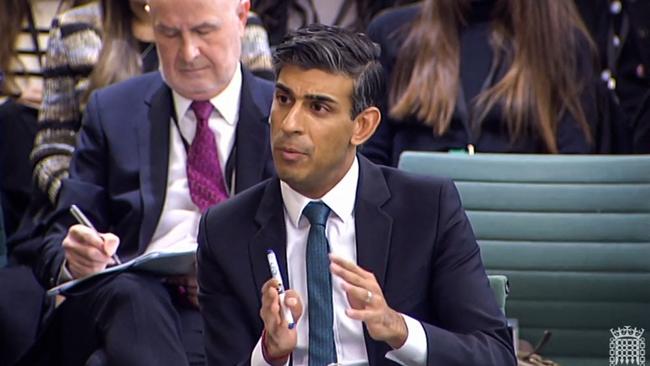
In reality, a coup to remove Sunak is unlikely. Relatively few Conservative MPs have the appetite for another bloody change of leadership and the proximity of the next election is increasingly focusing minds.
But there will be mounting unrest on the Tory back benches, particularly if inflation remains stubbornly high and economic growth anaemic. Industrial action is expected to continue for months, with the added challenge of next year’s pay review settlements.
Earlier last year the Treasury earmarked 2 per cent increases in public sector pay across the board, a move which appears increasingly politically unsustainable.
Labour’s strongest line of attack - the Tory mortgage premium - is likely to have added impetus later in the year as many fixed-rate deals come to an end.
Meanwhile, clamours for tax cuts will grow louder, putting pressure on Jeremy Hunt to at least set out a path for reducing the tax burden ahead of the spring budget.
And if there are no tangible results from Sunak’s five-point plan to tackle Channel crossings by migrants there will be revolt in many red wall seats. Sunak’s path is narrow, which is why he is likely to follow the advice of his most senior advisers and go long, with a general election as late as January 2025.
COULD THERE BE A GENERAL STRIKE?
Chris Smyth, Whitehall Editor: Technically not - but it may well feel like one. Britain’s only official general strike came in 1926, when more than 1.5 million workers walked out in a nine-day action to support coalminers facing pay cuts, disrupting transport and power supplies and shutting down newspaper presses.
Co-ordinated action across different sectors in support of a single industry dispute was banned in the 1980s. But high inflation means so many different public services are in their own pay disputes that joining forces is once again being discussed.
The Trades Union Congress has played down suggestions that it will co-ordinate industrial action across transport, civil servants, NHS staff and teachers for maximum impact. But unions such as the PCS (Public and Commercial Services) have expressed a desire to time their strikes with others. This could, for example, involve civil servants in National Highways and Border Force walking out on the same day as rail unions in order to cripple the transport network.
Other unions such as the Royal College of Nursing are likely to shy away from such joint action for fear of appearing too political. With ministers under little pressure from backbenchers to reopen pay deals, however, and another below-inflation settlement looming in 2023, this wave of strikes is likely to continue and intensify through the spring. Generalised strikes over a protracted period could end up being more disruptive than one climactic walkout.
While the 1926 strike and unrest in the 1970s failed, the governments of the time were punished. Both sides have an incentive to find a creative compromise and avoid a repeat.
WILL THE PANDEMIC BE DECLARED OVER AND WHAT IS ITS LEGACY?
Tom Whipple, Science Editor: Is 2023 the year the pandemic finally ends? Three years ago, in January 2020, the World Health Organisation announced that coronavirus was a “public health emergency of international concern”.
In the three years since, from Antarctica to Greenland, that declaration has been more than vindicated: not a territory has been spared. An estimated 20 million have died.
As with Spanish flu before, the virus is here for good. We know we won’t so much defeat it as accommodate it. The question is, has the world now achieved that accommodation? The end of a pandemic is a political and sociological decision as much as it is a virological one. How much risk can you bear? How much disruption can you put up with?
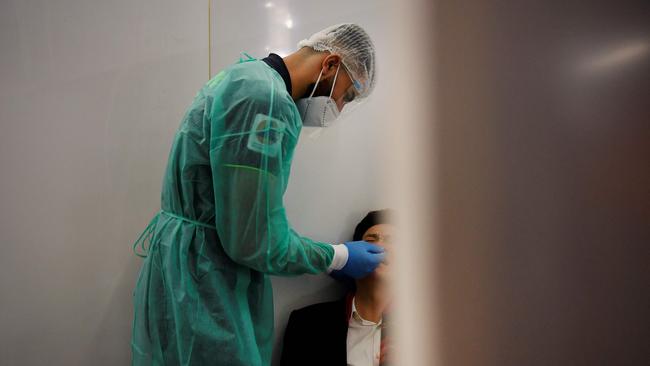
Practically, with or without the imprimatur of the WHO, Britain has already made that calculation. Arguably, the UK’s pandemic has been over since the lifting of most restrictions in the summer of 2021 - or at least since the decision not to reimpose them with the Omicron wave. In a heavily vaccinated, and now heavily infected, population it is still a disease that kills. It is just not one that threatens to bring down the health service too.
Elsewhere, this is still not the case. The pandemic began in China, and is finishing there too - with its last, greatest, wave. After squandering the opportunity lockdowns gave it to vaccinate, China is ending its pandemic the hard way. Hospitals are overwhelmed, there are queues at crematoriums and - perhaps the most telling sign - official statistics are meaningless, prompting Britain to introduce mandatory Covid tests for travellers. But this too shall pass. Already, the infection wave is peaking in Beijing.
Early in 2023 the WHO is due to meet again. Then, says Dr Tedros Adhanom Ghebreyesus, its director-general, they would like to make a statement as much about symbolism as practical public health: “We are hopeful that at some point next year we will be happy to say that Covid-19 is no longer a global health emergency.”
CHARLES III’S CORONATION WILL BE A CHANCE FOR THE BRITISH MONARCHY TO RESET
Valentine Low, Royal Correspondent: Death, Netflix and racial controversy: the past months have not been good for the royal family. And for the King, the father who must be wondering how it all went so wrong, the painful family saga of the royals-in-exile and their seemingly never-ending litany of complaints continues as he awaits the publication of Prince Harry’s book Spare next Tuesday.
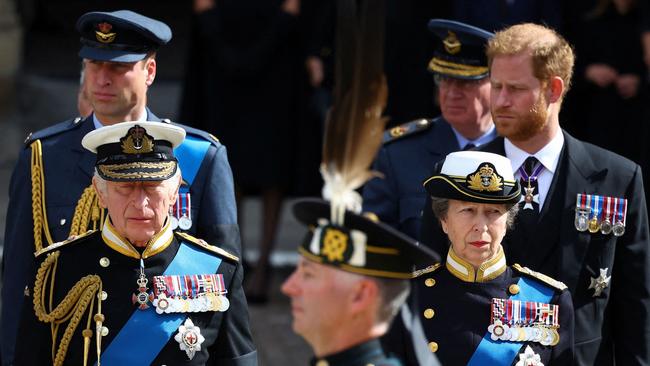
Yet there is cause for optimism. The King’s coronation in May will be a chance for the monarchy to do what it does best: put on a good show. Buckingham Palace, seemingly stung by the jibes about a “cut-price coronation”, is now determined to let everyone know that this will be British pageantry at its best.
They know the eyes of the world will be on us. As long as people can suspend disbelief long enough to lose themselves in the majesty and mystique of the coronation ceremony, then all the criticism and controversy that have bedevilled the royal family will, for the moment, be forgotten.
But there are two caveats. One is that the King needs to make peace with his younger son. The other is that the coronation cannot be just about pomp and circumstance: it needs to prove that the royal family understands modern Britain. Unless it shows that Charles can be a King for the 21st century, then all it will do is bring fleeting succour. The ancient and modern must walk hand in hand.
WHAT NEW GADGETS OR INVENTIONS WILL CHANGE OUR LIVES IN 2023?
Mark Sellman, Technology Correspondent: 2022 will be remembered for the tech “winter”, when the industry woke up to the post-pandemic world and realised it got its sums wrong and had to sack, backtrack and re-evaluate. Nowhere was this more evident than in cryptocurrency, which was hit by scandal, investor flight, business failure and the lack of product despite the billions invested.
More tech companies will fail this year as they run out of money in a high-interest-rate environment. Many jumped on the progress in AI as a source of hope. ChatGPT, a sophisticated chatbot, had a test release that had many predicting the demise of Google and the disruption of white-collar jobs. Expect that to continue in 2023 when a new version comes out, GPT4. Its maker, OpenAI, is backed by Microsoft and it could integrate it into its Bing search engine or other products if developers overcome its major shortcoming - it tells fibs very convincingly.
Apple will venture into augmented/virtual reality with a new headset, but it will be too expensive to be a mass consumer product straight away. More of us will buy second-hand phones and personal tech as costs bite and websites offer good guarantees on refurbished hardware. More will be learnt about Big Tech as firms submit information to UK and EU regulators ahead of new laws. Elon Musk will have a better time at Twitter as he brings in new features, installs a chief executive and devotes more time to Tesla and less to culture wars.
CAN DONALD TRUMP STAGE A COMEBACK - OR WILL RON DESANTIS TIGHTEN HIS GRIP ON THE PRESIDENTIAL NOMINATION?
David Charter, US Editor, in Washington: Only one thing is certain about Donald Trump’s attempt to return to the White House - it will be a wild ride.
His campaign started terribly with a lacklustre launch missed by three of his children followed by several reverses big enough to sink a lesser ego, including dinner with antisemites and persuasive calls for his prosecution.
Trump, 76, is lashing out and complaining ever more frequently as he faces a strong rival for the Republican nomination in Ron DeSantis, the Florida governor. The 44-year-old appeals through his stance against immigration and wokeism to Trump’s Make America Great Again (Maga) movement that has taken over the party.
Trump is down but he is not yet out. Polls on who is ahead vary hugely and suggest a volatile contest. Trump cannot be written off, given the grip that he and his followers have on the party. Commentators view his vulnerability as playing to his advantage by drawing in a long list of Republican hopefuls, enabling Trump to repeat his 2016 trick of winning the anti-establishment vote against the field with just 30 to 40 per cent of the overall vote.
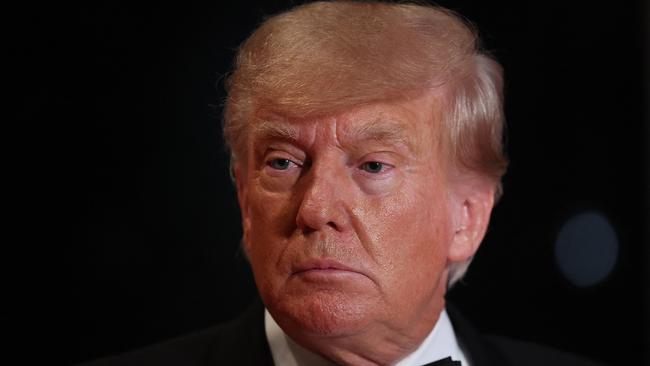
There is every sign that DeSantis will go for it. To prevail in 2024, he will have to declare this spring and build momentum through key endorsements that dissuade rivals. He will be painted by Trump as the establishment guy, just as with the last Florida governor who stood in his way - Jeb Bush.
Trump will probably face prosecution, whether in Georgia for leaning on officials to find him votes or by the Department of Justice on the recommendation of the special counsel Jack Smith over the January 6 riot or retention of documents. A conviction will not stop him - a candidate can run for president from prison in America - and will be utilised to keep the spotlight on his campaign. In the next 12 months Trump is likely to remain the biggest talking point in US politics.
President Biden is set to announce a run for a second term in 2023. Despite historically low levels of approval and being by far the oldest president - he will be 82 shortly after the next election - he remains the most popular senior Democrat. No serious contender is likely to oppose him.
WHO WILL WIN THE PREMIER LEAGUE?
Henry Winter, Chief Football Writer: The Premier League title race is open, and there are some welcome new plotlines and characters in the great English drama. It’s tempting to join the rush and leap on the Arsenal bandwagon, all aboard, squeeze in, budge up, standing-room only. Arsenal have a manager in Mikel Arteta who all their fans finally realise is the real deal, a good team-builder, man-manager and tactician. The league leaders have early contenders for player of the year in Martin Odegaard, Bukayo Saka and Granit Xhaka. Newcastle United also cannot be ignored, not simply because the shrewd Eddie Howe is building something special on Tyneside but also they have no European distraction. Liverpool, Chelsea, Spurs and Manchester United also have hopes of involvement at the top.
But I’m sticking with Manchester City. I went for them at the start of the season and it’s too early to abandon the champions. Not with Pep Guardiola’s ferocious hunger to win and his experience of the league marathon. Not with Erling Haaland the best finisher in the Premier League, Kevin De Bruyne still smarting from Belgium’s World Cup under-achievement, Phil Foden wanting to keep reminding everyone of his precocious talent, Nathan Ake wanting to build on his superb World Cup, and Julian Alvarez a more confident, battle-hardened performer since Qatar, and also with such strength in depth.
Arsenal’s bench has improved but Guardiola can bring on Jack Grealish and Riyad Mahrez, and such prospects as Cole Palmer. The five-sub rule allows Guardiola to change half his outfield in the second half and maintain intensity. City’s primary focus could, of course, be the Champions League, which would give Arsenal their chance.
But Arteta’s team have to maintain this furious pace - or Guardiola’s thoroughbreds will chase them down.
CAN THE LIONESSES SUCCEED AGAIN WHERE THE MEN FAILED AND WIN THE WORLD CUP?
Molly Hudson, Football Reporter: England’s historic European Championship win has had a long-lasting influence away from the pitch, but on it they will enter 2023 as the world’s in-form side, and favourites for the World Cup.
Sarina Wiegman, the England manager, knows her side now have a target on their back; winning the trophy in the summer meant they transformed from the hunter to the hunted. She has what Gareth Southgate does not - experience at winning two major tournaments.
England have talent in abundance, and a squad led by the captain Leah Williamson, who is one of several reaching their prime. The anterior cruciate ligament injury sustained by Beth Mead, the BBC’s Sports Personality of the Year and Player of the Tournament at the Euros, is a major blow and if it does not rule her out of the World Cup entirely, it is unlikely she will be in form. England are ranked fourth in the world by Fifa but have reason for optimism having beaten all of the teams above them - the United States, Germany and Sweden - in the last five months.
Wiegman fell at the final hurdle in the 2019 final while managing the Netherlands. Their victors that day, the United States, will be among the favourites again, although their stars like Megan Rapinoe and Alex Morgan are well into their thirties and coming up to the tail end of their careers.
Since the Lionesses’ success in July, it has been Wiegman’s unflappable approach that has emerged as the driving force behind that victory. She will need that and more in a tough draw that could see England meet Germany in the quarter-finals, but for the first time ever there is an unshakeable belief around this England side - they appear simply unstoppable.
The Times

To join the conversation, please log in. Don't have an account? Register
Join the conversation, you are commenting as Logout